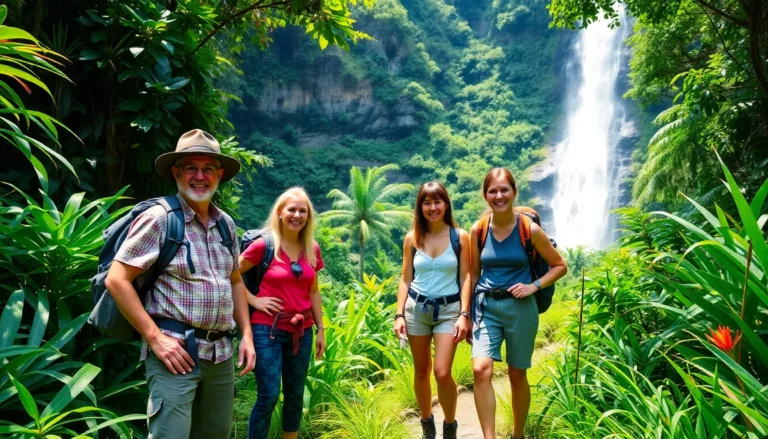Italy isn’t just about pasta and pizza; it’s a treasure trove of eco-friendly adventures waiting to be explored. Imagine sipping organic wine in a sun-drenched vineyard or hiking through the breathtaking Dolomites, all while treading lightly on the earth. Eco tourism in Italy offers travelers the chance to indulge their wanderlust without leaving a hefty carbon footprint.
eco tourism italy
Italy excels as a prime eco tourism destination, merging natural beauty with sustainable practices. Travelers explore the country’s diverse landscapes, engaging in activities that minimize their ecological footprint. Many choose organic wine tours in Tuscany, where vineyards implement environmentally friendly farming methods.
The Dolomites present another opportunity for eco-conscious adventures. Hiking here allows individuals to experience breathtaking views while promoting conservation efforts. Numerous trails showcase local flora and fauna, emphasizing the importance of preserving natural habitats.
Coastal regions, such as the Cinque Terre, offer eco-friendly options as well. Visitors can use public transportation or walk between towns, reducing carbon emissions. These practices enhance the overall experience and contribute positively to local communities.
Italy’s commitment to eco tourism extends beyond outdoor activities. Many accommodations prioritize sustainability, utilizing renewable energy sources and offering locally sourced cuisine. Such efforts align with a growing trend among travelers who seek environmentally responsible options.
Local initiatives also focus on preserving cultural heritage. Engaging with traditional crafts or participating in community-based projects helps maintain local customs while educating visitors. These interactions create meaningful connections between travelers and residents, enriching the overall experience.
Events centered on eco awareness, like local festivals or workshops, promote sustainable practices and highlight Italy’s commitment to environmental preservation. Participants gain insights into regional conservation challenges and actively contribute to solutions. Thus, Italy emerges as a prominent figure in the global eco tourism movement, attracting conscientious travelers seeking memorable adventures.
Popular Eco Tourism Destinations

Italy boasts numerous eco tourism destinations that highlight its commitment to sustainability while showcasing natural beauty.
The Italian Alps
The Italian Alps present breathtaking scenery and outdoor activities that prioritize conservation. Visitors experience hiking trails that connect pristine environments with local flora and fauna. Eco-friendly lodges and mountain refuges often utilize renewable energy and serve organic local meals. Wildlife enthusiasts find opportunities for bird watching and wildlife tracking, fostering a deep appreciation for nature. Seasonal festivals celebrate local culture and enhance community engagement, enriching the overall experience.
Tuscany’s Countryside
Tuscany’s countryside is renowned for its rolling hills and organic vineyards. Eco tourism here includes wine tours that focus on sustainable farming practices and tasting locally produced wines. Travelers can cycle through vineyards while absorbing stunning landscapes and engaging with local farmers. Agriturismo stays offer immersive experiences, allowing guests to participate in traditional farming activities. Cultural workshops highlight local crafts, creating strong connections between visitors and the region’s heritage.
Coastal Regions and National Parks
Italy’s coastal regions and national parks provide diverse ecosystems and stunning vistas. The Cinque Terre National Park emphasizes the importance of sustainable tourism, promoting walking paths that reduce reliance on vehicles. Coastal accommodations often employ eco-friendly practices, such as water conservation and solar energy use. Visitors can enjoy kayaking, snorkeling, and guided eco-tours that explore marine life and coastal flora. National parks like Gran Paradiso offer unparalleled hiking routes and wildlife encounters, reinforcing Italy’s dedication to preserving its natural landscapes.
Sustainable Practices in Eco Tourism
Italy showcases a strong commitment to sustainable practices in eco tourism. Eco-friendly accommodations, local initiatives, and conservation efforts play vital roles in minimizing the environmental impact of travel.
Eco-Friendly Accommodations
Eco-friendly accommodations across Italy incorporate renewable energy sources. Many hotels and lodges utilize solar power and energy-efficient systems. Organic and locally sourced cuisine enhances guest experiences while supporting local farmers. Tourists often find eco-lodges in picturesque locations, allowing for easy access to nature while reducing travel distances. Green certifications from organizations like Green Globe identify accommodations that adhere to sustainable practices. Numerous travelers choose these eco-conscious options, enjoying both comfort and a lower carbon footprint.
Local Initiatives and Conservation Efforts
Local initiatives and conservation efforts reveal Italy’s deep commitment to sustainability. Community-based projects preserve cultural traditions while fostering connections between tourists and residents. Local festivals promote eco-awareness and educate visitors on sustainable practices. Organizations like Slow Food champion local cuisine, emphasizing the importance of environmental stewardship. These initiatives often involve protecting natural habitats, helping to sustain diverse ecosystems found in regions like the Italian Alps and Cinque Terre. Travelers can engage with these programs, directly contributing to the preservation of Italy’s rich cultural and natural heritage.
Benefits of Eco Tourism for Travelers
Eco tourism offers significant advantages for travelers looking for sustainable experiences. One benefit includes the opportunity to connect with local cultures and communities. Travelers can engage with residents, supporting traditional crafts and fostering meaningful relationships.
Exploring landscapes through eco-friendly activities enhances enjoyment and appreciation of nature. Hiking in the Dolomites or touring organic vineyards in Tuscany immerses travelers in stunning environments while promoting conservation. Such activities often encourage lower carbon footprints.
Accommodations that prioritize sustainability provide comfortable lodging options. Eco-friendly lodges, featuring solar energy and locally sourced meals, allow guests to indulge while reducing environmental impact. Staying in these green accommodations supports local economies and promotes sustainable practices.
Travelers often discover unique experiences that traditional tourism may not offer. Participating in local eco-awareness events, such as festivals or workshops, enhances knowledge about environmental sustainability and appreciation for the region. These experiences deepen travelers’ understanding of ecological stewardship.
Choosing eco tourism contributes to environmental preservation as well. Individuals can help protect diverse ecosystems and support local conservation initiatives by limiting their physical footprint. Engaging in eco-tours showcases the importance of safeguarding natural habitats.
Another benefit includes fostering personal well-being. Spending time outdoors and immersing in nature can improve physical and mental health. Eco tourism encourages travelers to unplug and enjoy the serene beauty of Italy’s picturesque landscapes.
Overall, travelers benefit from eco tourism in Italy by experiencing cultural richness, environmental connectivity, and personal growth while supporting sustainable practices across the region.
Challenges Facing Eco Tourism in Italy
Italy faces several challenges in developing and promoting eco tourism effectively. Overcrowding in popular destinations often leads to environmental degradation and diminished visitor experiences. Heavy foot traffic along paths in locations like Cinque Terre can cause soil erosion and damage to fragile ecosystems.
Furthermore, insufficient infrastructure and resources dedicated to sustainable practices hinder progress. Many rural areas lack adequate public transportation or facilities, which limits eco-friendly travel options. In addition, misconceptions about eco tourism may deter potential travelers who see it as inconvenient or overly restrictive.
Another significant issue involves balancing economic interests with environmental preservation. Local communities often rely on traditional tourism for income, creating conflicts between conservation efforts and the demand for rapid development. Establishing policies that support eco tourism while protecting cultural heritage remains a complex task.
Additionally, climate change poses threats to Italy’s unique ecosystems, impacting biodiversity and the beauty that attracts eco-conscious visitors. Rising temperatures and extreme weather patterns can disrupt local agriculture and tourism seasons. As a result, the Italian government and local organizations face pressure to adapt to these changing conditions.
Lastly, education and awareness about sustainable practices need enhancement among both travelers and service providers. Promoting local initiatives that educate visitors about their ecological impact ensures eco tourism fosters a positive relationship with the environment. Connecting travelers with community-led projects can reinforce the dedication to preserving Italy’s natural beauty while supporting local economies.
unforgettable experiences
Italy stands out as a remarkable eco tourism destination that beautifully blends sustainability with unforgettable experiences. From the breathtaking Dolomites to the organic vineyards of Tuscany, travelers can immerse themselves in nature while supporting local communities and conservation efforts.
Choosing eco-friendly activities not only enhances the travel experience but also fosters a deeper connection with Italy’s rich cultural heritage. By prioritizing sustainable practices and engaging in local initiatives, visitors contribute to the preservation of Italy’s stunning landscapes and vibrant ecosystems.
As travelers seek to explore the world responsibly, Italy offers a compelling invitation to enjoy its natural beauty while making a positive impact on the environment.




